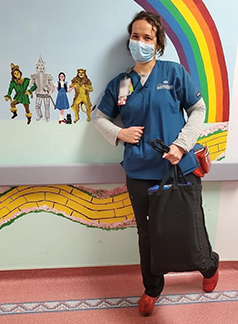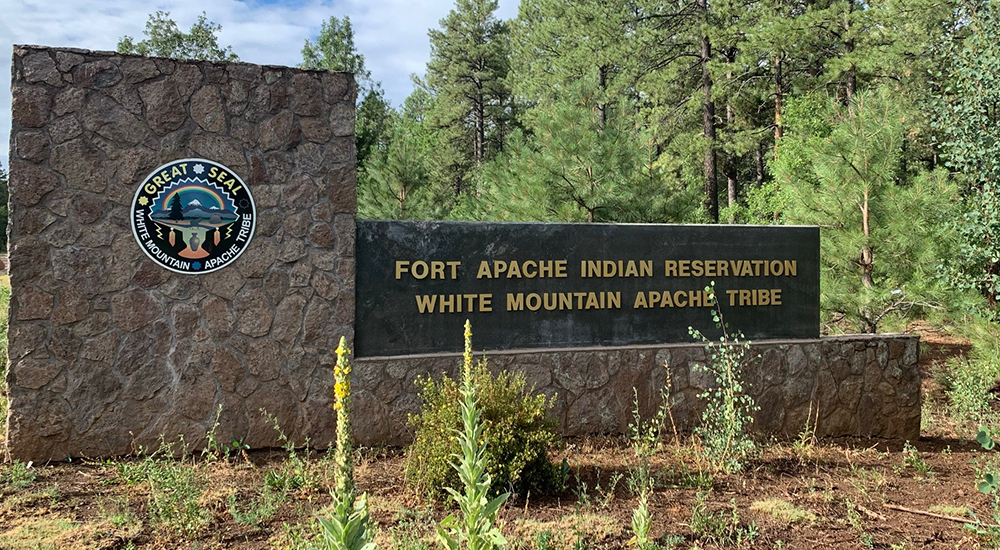When Dorothy Barrow walked down the corridor of the Whiteriver Indian Hospital for the first time, it all made sense to her. From the warm greetings by staff, a colorful Wizard of Oz mural on the wall and her own ruby red clogs, Barrow felt right at home. She was ready to support the White Mountain Apache Reservation in Arizona during a peak period of COVID-19 cases in June.
As a registered nurse with VA Eastern Colorado Health Care System (ECHCS), Barrow first signed up in 2019 as a Disaster Emergency Medical Personnel System (DEMPS) volunteer. Then, when the coronavirus pandemic hit U.S. soil in early 2020, Barrow was ready to be called to support either another VA or non-VA facility in the community. She had no idea where she’d end up.

Barrow in front of a Wizard of Oz mural inside the Whiteriver Indian Hospital on the White Mountain Apache Reservation in Arizona.
When the moment finally arrived, Barrow became the first ECHCS employee in approximately seven years to deploy through DEMPS. By June, ECHCS was already experiencing a downturn from its own peak of COVID-19 cases. That made it a prime opportunity for Barrow to help the White Mountain Apache Tribe during critical time.
Apaches “have been infected at more than 10 times the rate of people in the state as a whole,” according to an August New York Times article.
“Humbling to be accepted into their cultural traditions”
“It was an honor to be first,” Barrow said. “It was a humbling experience to be accepted into their cultural traditions while being helpful at the same time.”
Nicknamed “girl with the red shoes,” Barrow found herself embraced by everyone she met during the extended six-week deployment. She helped relieve the strain on the night-shift family care unit staff. They were challenged to attend to an unusually high number of patients.
Beyond her regular nurse duties, sometimes Barrow was the second nurse needed to administer controlled medications.
Isolation from important traditions
Other times, with the help of a translator, she’d listen to patients six feet away from their door. They talked about how isolation prevented them from participating in important traditions. As a community deeply rooted in cultural ceremonies and close-knit family ties, isolation has been particularly difficult for the White Mountain Apache Tribe to endure.
Fortunately, as a key component of VA’s fourth mission to provide back-up health services to the nation in times of declared emergencies or disaster, the DEMPS program is a way for non-clinical and clinical VA staff, like Barrow, to serve areas of the country in need.

Barrow with fellow night-shift family care unit crew members at the Whiteriver Indian Hospital during the first wave of her deployment in June 2020.
Barrow worked with a group of 15 to 16 other DEMPS volunteer nurses from VA medical centers around the country. They provided both Whiteriver Indian Hospital staff and patients with relief or an extra hand needed when minutes mattered most.
“The importance of the DEMPS program is that, at some time in our lives, we all need help — even those who provide care to our Veterans,” said Demetrius Ortega. Ortega is the DEMPS and Emergency Management coordinator. “DEMPS provides us with the opportunity to serve not only other VA health care systems, but the community in general. The program is very gratifying to all those who serve. It’s vital to VA, helping us complete the Fourth Mission.”
“Thank you for coming to our rescue”
Barrow said the support she received from her hospital’s leadership and Emergency Management meant everything to her. It allowed her to extend her time making a difference in Whiteriver. She left accomplishing her lifelong goal to one day serve populations most typically underserved in society: Veterans, those in prison systems and the Indian Health Service community.
“Everyone was so kind,” Barrow said, while reflecting on her experience. “They didn’t want me to go and showered me with thank yous.”
One Whiteriver ER nurse remarked about her time working with VA nurses: “We learned so much from each other. We shared a few heartbreaks and sadness as well. Thank you for coming to our rescue when we needed it the most. You were truly the best parts of the fight against COVID-19. Thank you for your friendship.”
Barrow said she especially misses listening to the Apache language being spoken. She has made lifelong friends on her deployment who she hopes to meet one day again somewhere over the rainbow.
Terri Rorke is a public affairs specialist at the Denver VA.
Topics in this story
More Stories
Veteran Byron Potier weighed almost 300 pounds and was tired and lethargic. He was the perfect candidate for gastric sleeve surgery.
How much do you know about VA care, benefits and services? Don’t miss out on what you've earned—check out the "2025 VA Federal Benefits Guide for Veterans, Dependents, Survivors, and Caregivers" handbook to learn more.
Feeling stressed? Your breath can help you relax and focus. Take 3 minutes to reset and prioritize your well being for this week's #LiveWholeHealth practice.






